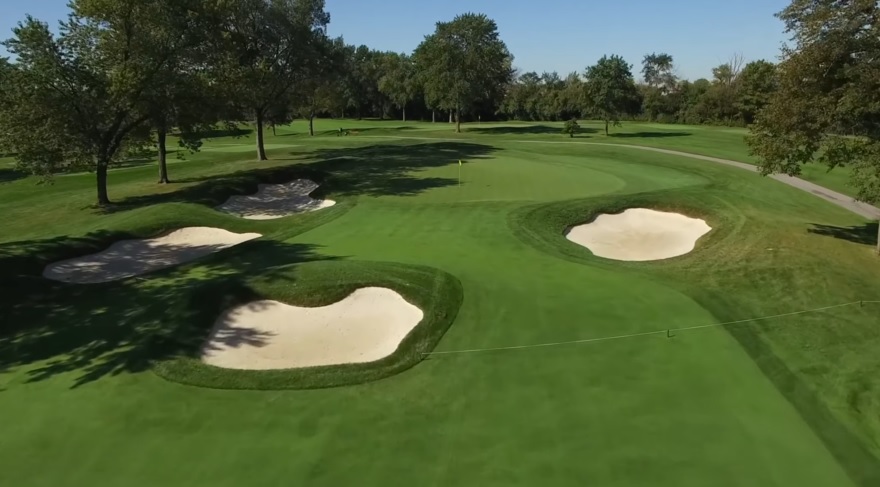Olympia Fields Country Club is a private golf club in the central United States, located in Olympia Fields, Illinois, a suburb of Chicago, about 25 miles (40 km) south of The Loop. It has been the site of the U.S. Senior Open (1997) the U.S. Amateur (2015), and the 2017 KPMG Women’s PGA Championship. In addition, the Western Open on the PGA Tour was played at the club five times.. Olympia Fields has hosted four major championships: two U.S. Opens (1928, 2003) and two PGA Championships (1925, 1961). How much is Olympia Fields Country Club membership fees? And what about North Course scorecard.
It contains two eighteen-hole courses, North and South. The North Course is considered one of the top three courses in the Chicago area, and is generally ranked in the top 50 courses in the United States. The South Course is regularly ranked in the top ten in Illinois. Olympia Fields is one of the few private clubs in the U.S. with multiple courses ranked, and it is on the National Register of Historic Places.
Olympia Fields is famous for its enormous clubhouse, which was finished in 1925 at a cost of $1.3 million. It is a half-timbered English Tudor-style building with an 80-foot-high (24 m), four-faced clock tower that has become the trademark of the club. The western boundary of the property is bordered by a commuter rail line, Metra Electric District, and its Olympia Fields station is just west of the clubhouse; the line was previously the Illinois Central Railroad.
Golf Course Information
About Olympia Fields, North
Olympia Fields Country Club
Golf Only facility
20 tees driving range
36 regulation holes
Awards at Olympia Fields, North
- Golfweek Magazine’s America’s Best Top 100 Classic (pre-1960) Courses 2006
- Golf Digest Magazine’s America’s 100 Greatest Public and Private Golf Courses 2005-2006
- Golf Digest Magazine’s Top Rated Golf Courses for Illinois 2005-2006
- Golf Magazine’s Top 100 Courses in the U.S. 2005
- Golfweek Magazine’s America’s Best Top 100 Classic (pre-1960) Courses 2005
- Golf Magazine’s Top 100 Courses in the U.S. 2003
- Golf Magazine’s Top 500 Holes in the World 2000
Olympia Fields Country Club membership fees
Private clubs like Olympia Fields are accessible to the daily-fee golfer — at a price. The TaylorMade Performance Lab at the club, which uses high-tech computers to fit clubs and fix swings, is open to the public, at a stiff $400 for two hours.
Olympia Fields’ initiation fee, at $50,000, and annual dues and fees, at less than $11,000, cost less than clubs of comparable rank. Membership, at 500 families, has been undersubscribed lately, which means no waiting list to get in.
Charity functions feature golf on Mondays, when the club is otherwise closed. The Evans Scholars summer outing is Monday (call the Western Golf Assn. at 847/724-4600) and the Big Shoulders Fund Golf Classic is Aug. 11 (call 312/751-8337).
North Course scorecard – Google Earth view
North Course scorecard
Nearly 600 yards was added to the length, bringing it to a major league 7,200 yards. Florida-based architect Steve Smyers restored the deep sculpting to bunkers that had been allowed to go flat and dull over time. He reconfigured greens and tee boxes, improved drainage systems and even moved some fairways.
Members at the private Olympia Fields, open to the public for lessons and charity events, have lavished substantial investment on their 18-hole South Course, updating and expanding the historic 1918 Tom Bendelow design.
The result, a monstrously tough challenge that remains true to its origins, ranks as one of the finest course makeovers around Chicago in recent years. The first two massive par 4s, one 459 yards and the other 482 yards, make it clear from the start that this club aims to regain national stature. No. 5 is a 243-yard par 3 that might be stretched even longer for tournament conditions. It would defy even the best pros from taking aim at birdie.
Among the redone course’s most challenging holes: the 243-yard No. 5.
At the same time, the middle tees, at 6,555 yards, and the forward markers, at 5,500 yards, allow the ordinary player to enjoy the forest-lined fairways and sharply undulating greens best suited to big-hitting low-handicappers. It’s hard to find fault with any of Mr. Smyers’ decisions. He’s fashioned No. 3, for instance, into an all-new 182-yard par 3 uphill to a fortress-like green that slopes both right to left and back to front. At No. 4, a par 5 of 543 yards, he nudged the fairway left, installed a fresh set of fairway traps on the right side, then added a big trap 40 yards in front of the green to catch wobbly lay-ups. New mounds have been sculpted in many places.



